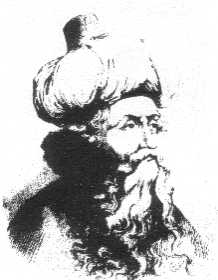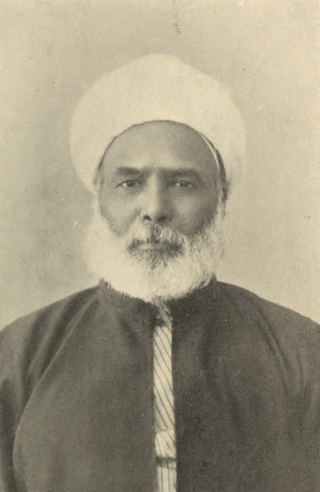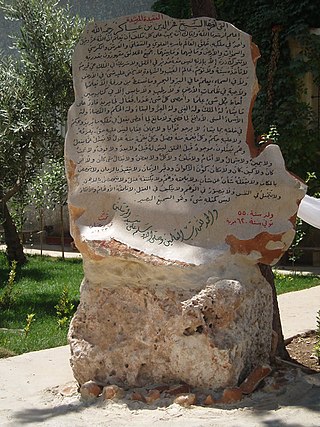Deconstruction is a loosely-defined set of approaches to understanding the relationship between text and meaning. The concept of deconstruction was introduced by the philosopher Jacques Derrida, who described it as a turn away from Platonism's ideas of "true" forms and essences which are valued above appearances.

Ibn ʿArabī was an Andalusi Arab scholar, mystic, poet, and philosopher, extremely influential within Islamic thought. Out of the 850 works attributed to him, some 700 are authentic while over 400 are still extant. His cosmological teachings became the dominant worldview in many parts of the Muslim world.
Islamic studies refers to the academic study of Islam, which is analogous to related fields such as Jewish studies and Quranic studies. Islamic studies seeks to understand the past and the potential future of the Islamic world. In this multidisciplinary program, scholars from diverse areas participate and exchange ideas pertaining to the particular field of study.

Ibn Taymiyya was a Sunni Muslim scholar, jurist, traditionist, ascetic, and proto-Salafi and iconoclastic theologian. He is known for his diplomatic involvement with the Ilkhanid ruler Ghazan Khan at the Battle of Marj al-Saffar, which ended the Mongol invasions of the Levant. A legal jurist of the Hanbali school, Ibn Taymiyya's condemnation of numerous folk practices associated with saint veneration and visitation of tombs made him a contentious figure with many rulers and scholars of the time, which caused him to be imprisoned several times as a result.

Muḥammad ʿAbduh was an Egyptian Islamic scholar, judge, and Grand Mufti of Egypt. He was a central figure of the Arab Nahḍa and Islamic Modernism in the late 19th and early 20th centuries.

Qutb, Qutub, Kutb, Kutub or Kotb means 'axis', 'pivot' or 'pole'. Qutb can refer to celestial movements and be used as an astronomical term or a spiritual symbol. In Sufism, a Qutb is the perfect human being, al-Insān al-Kāmil, who leads the saintly hierarchy. The Qutb is the Sufi spiritual leader who has a divine connection with God and passes knowledge on which makes him central to, or the axis of, Sufism, but he is unknown to the world. There are five Qutbs per era, and they are infallible and trusted spiritual leaders. They are only revealed to a select group of mystics because there is a "human need for direct knowledge of God".
Barzakh is an Arabic word meaning "obstacle", "hindrance", "separation", or "barrier". In Islam, it denotes a place separating the living from the hereafter or a phase/"stage" between an individual's death and their resurrection in "the Hereafter". It is also considered as a place where souls rest until the day of judgement. It bears resemblance to the Intermediate state in Christianity.

Sufism is the mystical branch of Islam in which Muslims seek divine love and truth through direct personal experience of God. This mystic tradition within Islam developed in several stages of growth, emerging first in the form of early asceticism, based on the teachings of Hasan al-Basri, before entering the second stage of more classical mysticism of divine love, as promoted by al-Ghazali and Attar of Nishapur, and finally emerging in the institutionalized form of today's network of fraternal Sufi orders, based on Sufis such as Rumi and Yunus Emre. At its core, however, Sufism remains an individual mystic experience, and a Sufi can be characterized as one who seeks the annihilation of the ego in God.

Sufi philosophy includes the schools of thought unique to Sufism, the mystical tradition within Islam, also termed as Tasawwuf or Faqr according to its adherents. Sufism and its philosophical tradition may be associated with both Sunni and Shia branches of Islam. It has been suggested that Sufi thought emerged from the Middle East in the eighth century CE, but adherents are now found around the world.

Sufi literature consists of works in various languages that express and advocate the ideas of Sufism.
Michael Anthony Sells is John Henry Barrows Professor of Islamic History and Literature in the Divinity School and in the Department of Comparative Literature at the University of Chicago. Michael Sells studies and teaches in the areas of Qur'anic studies, Sufism, Arabic and Islamic love poetry, mysticism, and religion and violence.
Miguel Asín Palacios was a Spanish scholar of Islamic studies and the Arabic language, and a Roman Catholic priest. He is primarily known for suggesting Muslim sources for ideas and motifs present in Dante's Divine Comedy, which he discusses in his book La Escatología musulmana en la Divina Comedia (1919). He wrote on medieval Islam, extensively on al-Ghazali. A major book El Islam cristianizado (1931) presents a study of Sufism through the works of Muhyiddin ibn 'Arabi of Murcia in Andalusia. Asín also published other comparative articles regarding certain Islamic influences on Christianity and on mysticism in Spain.
Christopher Wise is a cultural theorist, literary critic, scholar, and translator. His publications largely focus on Sahelian West Africa, especially Mali, Burkina Faso, and Senegal, as well as Palestine, Jordan, and Israel. He has also published theoretical works on Fredric Jameson, Jacques Derrida, and Noam Chomsky.

The Taifa of Seville was an Arab kingdom which was ruled by the Abbadid dynasty. It was established in 1023 and lasted until 1091, in what is today southern Spain and Portugal. It gained independence from the Caliphate of Cordoba and it expanded the territory it ruled in the mid-11th century. The emerging power of Castile led Seville to ask military assistance from the Almoravids, who then occupied Seville.
Roberto Rino Magliola is an Italian-American academic specializing in European hermeneutics and deconstruction, comparative philosophy, and inter-religious dialogue. He is retired from the National Taiwan University and Assumption University of Thailand.

Abd al-Wahhab al-Sha'rani was a highly influential Egyptian scholar. He was an eminent jurist, traditionist, historian, mystic and theologian. He was one of the Islamic revivalists and scholastic saints of the sixteenth century. He is credited for reviving Islam and is one of the most prolific writers of the early Egyptian-Ottoman period. His legal, spiritual, and theological writings are still widely read in the Muslim world today. He is regarded as "one of the last original thinkers in Islam." He was the founder of an Egyptian order of Sufism, eponymously known as Šaʿrāwiyyah. The order gradually declined after Shaʿrani's death, although it remained active until the 19th century.

The Maizbhandari, or sometimes Maijbhandari, order or tariqa of Sufism within Sunni Islam was founded in the late 19th century by the Bengali Sufi saint Ahmad Ullah Maizbhandari from Chittagong. It is the only Sufi order to have originated from within the Bengal region, and, as an indigenous movement, it has continued to enjoy significant popularity through to the 21st century.
Gisela Goodrich Webb is an American scholar of comparative religion and professor emerita of religious studies at Seton Hall University in South Orange, New Jersey. Her works mainly focus on the intellectual and mystical traditions of Islam, Muslim women's rights and Islam in America.
Victor Danner was a Mexican-American author, researcher, and translator specializing in comparative religion and Islamic mysticism.







